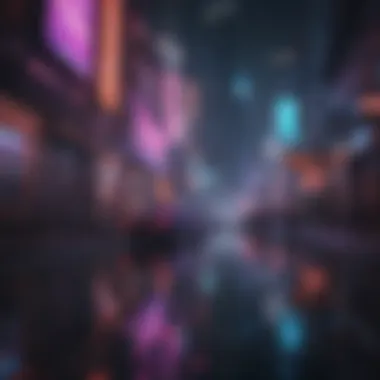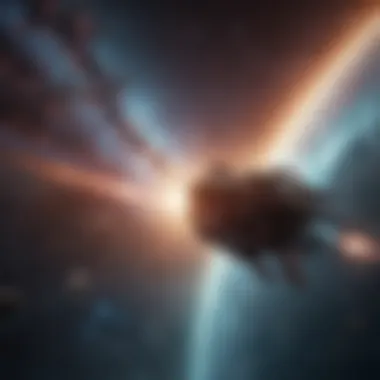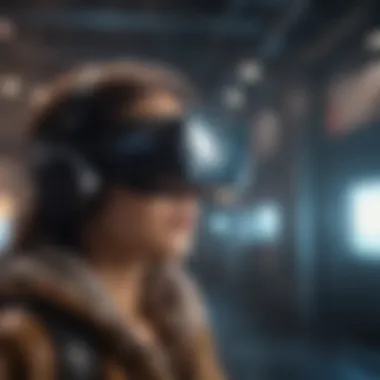Unveiling a Cinematic Universe: A Journey Through Top Sci-Fi Films for PopCultix Fans


Industry Insights
In the ever-evolving landscape of popular culture, sci-fi movies hold a significant position, attracting a diverse audience of enthusiasts. From the post-apocalyptic worlds to the advanced technological marvels, the genre continues to captivate imaginations and push boundaries of storytelling. Exploring recommended sci-fi movies for the avid Pop Cultix audience delves into a curated selection that combines iconic classics with contemporary gems, promising a cinematic journey filled with visionary narratives and boundless possibilities.
Reviews & Recommendations
Embark on a cinematic odyssey through a handpicked collection of sci-fi movie reviews and recommendations tailored for the discerning Pop Cultix readers. From in-depth analyses of comic book series to insightful critiques of movie and TV shows, this comprehensive guide aims to provide insightful recommendations that align with the unique tastes and preferences of enthusiasts. Dive into the must-watch anime suggestions, explore gaming console and game reviews, and discover the top picks in pop culture merchandise that elevate the fan experience to new heights.
News & Updates
Stay informed and up-to-date with the latest breaking news and updates from the vibrant world of pop culture. Uncover exclusive insights into the comic industry's current trends, delve into casting announcements for upcoming movies and TV shows, and explore the dynamic shifts within the gaming industry. Whether it's discovering release dates or unveiling thrilling trailers, this section keeps readers well-informed and engaged with the pulsating heartbeat of pop culture.
Feature Articles
Delve deeper into the intricate layers of pop culture through engaging feature articles that offer unique perspectives and insightful analysis. Examine the profound impact of iconic comic book characters, compare genres in movies and TV shows, unravel the mysteries of anime subculture, and venture into the competitive world of gaming tournaments and esports. Witness the magic of pop culture crossovers and collaborations that blur the lines between mediums, enriching the cultural tapestry with dynamic creativity and innovation.
Introduction to Sci-Fi Genre
In this section, we delve into the captivating world of science fiction, a genre that has enthralled audiences with its imaginative narratives and futuristic concepts. Science fiction serves as a portal to explore speculative ideas and push the boundaries of human creativity. As we embark on this journey through the realm of sci-fi, we will uncover the intricacies of this genre that merge science with fiction to create thought-provoking and visionary storytelling.
Defining Science Fiction
Characteristics of Sci-Fi Films
Science fiction films are characterized by their exploration of hypothetical scientific or technological advancements and their impact on society and individuals. The key characteristic of sci-fi films lies in their ability to provoke introspection and discussion about the implications of scientific progress. By envisioning worlds that challenge the known realities, sci-fi films offer audiences a glimpse into potential futures and alternate realities. This characteristic makes sci-fi films a compelling choice for this article, as they stimulate curiosity and spark contemplation about the unknown.
Evolution of Science Fiction in Cinema
The evolution of science fiction in cinema traces the genre's transformation from simple speculative stories to complex narratives that reflect contemporary concerns and aspirations. Over the years, sci-fi films have evolved to address profound existential questions, ethical dilemmas, and societal issues through the lens of futuristic settings and advanced technologies. This evolution enriches the genre by infusing it with deeper meanings and broader perspectives, making it a valuable choice for this article. Despite facing challenges in maintaining scientific accuracy, the evolution of sci-fi in cinema offers filmmakers the creative liberty to envision bold and groundbreaking scenarios that captivate audiences.
Impact of Sci-Fi on Pop Culture
Influence on Technology and Society
The influence of science fiction on technology and society is profound, inspiring real-world innovations and shaping cultural attitudes towards progress. Sci-fi narratives often introduce futuristic technologies and scientific concepts that later inspire scientists and engineers to turn fantasy into reality. This influence not only drives technological advancements but also influences societal beliefs and expectations regarding the future. By exploring the impact of sci-fi on technology and society, this article sheds light on the symbiotic relationship between speculative fiction and real-world innovation.
Sci-Fi's Role in Imagining the Future
Sci-fi plays a crucial role in imagining the future by presenting divergent visions of what tomorrow might hold based on contemporary trends and concerns. Through scenarios that range from utopian societies to dystopian worlds, sci-fi narratives challenge audiences to contemplate the consequences of present-day actions and decisions. This role of sci-fi in envisioning the future enriches popular culture by offering alternative perspectives on current issues and fostering a sense of anticipation for what lies ahead. By examining sci-fi's role in imagining the future, we gain insight into the genre's capacity to stimulate critical thinking and shape collective aspirations.
Curated List of Recommended Sci-Fi Movies
In this section, we embark on a journey through a meticulously selected assortment of sci-fi movies tailored explicitly for the discerning taste of the Pop Cultix audience. This curated list serves as a compass leading enthusiasts through the vast galaxy of science fiction cinema, providing them with a handpicked selection of visionary narratives and immersive storytelling. By delving into this curated list, readers can explore a diverse array of iconic classics and contemporary gems that showcase the evolution and range of the sci-fi genre.


Classic Sci-Fi Masterpieces
2001: A Space Odyssey
Delving into the realm of 2001: A Space Odyssey, we encounter a cinematic masterpiece that redefines the very essence of science fiction storytelling. Its contribution to the genre is monumental, setting a standard for futuristic narratives and avant-garde filmmaking. The key characteristic of 2001: A Space Odyssey lies in its profound exploration of humanity's relationship with technology and the unknown, offering viewers a thought-provoking and visually stunning experience. This timeless classic stands out as a popular choice for this article due to its enduring relevance and impact on the sci-fi genre.
Blade Runner
Exploring Blade Runner unveils a cyberpunk noir masterpiece that delves into the complexities of identity, consciousness, and artificial intelligence. The key characteristic of Blade Runner lies in its atmospheric world-building and philosophical themes, making it a compelling choice for this article. Its unique feature lies in its fusion of neo-noir aesthetics with dystopian motifs, offering a riveting narrative that continues to captivate audiences. Blade Runner's advantageous position in this article stems from its influence on subsequent sci-fi works and its ability to provoke contemplation on the ethical implications of technological advancement.
Metropolis
Metropolis emerges as a pioneering sci-fi classic that lays the foundation for futuristic urban dystopias depicted in cinema. Its key characteristic revolves around its thematic exploration of class disparities and industrialization, making it a relevant and insightful choice for this article. The unique feature of Metropolis lies in its groundbreaking visual effects and set design, setting a benchmark for futuristic cityscapes in film. While Metropolis offers a compelling narrative rich in social commentary, its disadvantage may lie in its age, which could impact modern viewers' engagement.
Contemporary Sci-Fi Gems
Ex Machina
Venturing into Ex Machina, we encounter a contemporary gem that delves into the ethics of artificial intelligence and human interaction. The key characteristic of Ex Machina lies in its intricate portrayal of AI consciousness and morality, making it a thought-provoking choice for this article. This film's unique feature lies in its tension-filled atmosphere and subdued yet impactful storytelling, offering viewers a gripping exploration of technological ethics. While Ex Machina benefits from its innovation and thematic depth, its disadvantage may lie in its somber tone, which may not resonate with all audience demographics.
Arrival
A contemplation on Arrival reveals a sci-fi masterpiece that redefines the tropes of alien encounter narratives through linguistics and communication. The key characteristic of Arrival lies in its profound exploration of time, language, and extraterrestrial contact, positioning it as a standout choice for this article. The unique feature of Arrival lies in its nonlinear storytelling and emotive core, offering a poignant reflection on humanity's response to the unknown. Arrival's advantage in this article lies in its cerebral narrative and emotional depth, yet its potential disadvantage could stem from its slow pacing, which may require patience from viewers seeking fast-paced action.
Inception
Diving into Inception leads us into a world of dream manipulation, engaging viewers with its labyrinthine plot and visual grandeur. The key characteristic of Inception lies in its complex layers of reality and the ambiguity of dreams versus reality, making it a compelling choice for this article. The unique feature of Inception lies in its innovative narrative structure and mind-bending visuals, offering audiences a cinematic experience that blurs the lines between perception and subconscious. While Inception thrives on its intellectual puzzle and inventive concepts, its disadvantage may lie in its dense plot, which could be overwhelming for viewers unfamiliar with intricate storytelling.
Cult Classics & Hidden Gems
Primer
Exploring Primer takes us on a mind-bending journey through the complexities of time travel and cerebral paradoxes. The key characteristic of Primer lies in its intellectual rigor and nonlinear narrative, positioning it as a cult classic choice for this article. This film's unique feature lies in its low-budget yet intellectually stimulating approach to time travel, offering viewers a puzzle-like narrative that challenges conventional storytelling. Primer's advantage in this article stems from its cult following and reputation for narrative innovation, while its potential disadvantage could be its narrative opacity, requiring viewers to engage actively in deciphering its temporal intricacies.
Coherence
Unpacking Coherence reveals a hidden gem that delves into alternate realities and the blurring of boundaries between parallel universes. The key characteristic of Coherence lies in its mind-bending premise and improvisational filmmaking, making it an intriguing choice for this article. The unique feature of Coherence lies in its intimate scale and narrative tension, offering viewers a claustrophobic yet intellectually stimulating journey through existential uncertainties. Coherence's advantage lies in its indie charm and narrative originality, but its potential disadvantage may stem from its ambiguous resolution, leaving room for varied interpretations and viewer speculation.
Dark City
Embarking on Dark City immerses us in a stylized noir landscape where memory and reality intertwine in a dystopian metropolis. The key characteristic of Dark City lies in its atmospheric world-building and eerie ambiance, positioning it as a cult classic with hidden gems for this article. The unique feature of Dark City lies in its fusion of film noir aesthetics with sci-fi elements, offering viewers a surreal and haunting experience that challenges conventional genre boundaries. Dark City's advantage lies in its dark, brooding atmosphere and philosophical undertones, yet its potential disadvantage may lie in its somewhat convoluted plot, which could necessitate multiple viewings to grasp its full narrative complexity.
Exploration of Sci-Fi Subgenres


Exploring Sci-Fi Subgenres is a crucial aspect of this article as it delves into the diverse landscape of science fiction cinema. By highlighting subgenres like Cyberpunk, Dystopian Worlds, Space Exploration, Alien Encounters, Time Travel, and Parallel Realities, readers can gain a deeper understanding of the nuanced themes and storytelling approaches within the sci-fi genre. This exploration provides a detailed look at how different subgenres offer unique perspectives on technology, society, and existential questions, making it a must-read for any sci-fi enthusiast seeking to expand their cinematic horizons.
Cyberpunk and Dystopian Worlds
The Matrix
The Matrix stands out for its groundbreaking visual effects and imaginative depiction of a dystopian future controlled by intelligent machines. Its blend of philosophy, action, and science fiction elements has made it a staple choice for this article, offering viewers a thought-provoking narrative on reality and illusion. The unique feature of 'bullet time' in action sequences sets The Matrix apart, providing a visually stunning experience that continues to captivate audiences.
Children of Men
Children of Men is celebrated for its bleak portrayal of a world facing human infertility and societal collapse. The film's raw realism and intense storytelling make it a poignant selection for this article, showcasing the harrowing consequences of a dying society. Its use of long takes and immersive camerawork adds a layer of authenticity, drawing viewers into a world devoid of hope.
Brazil
Brazil explores a darkly satirical take on bureaucracy and conformity in a dystopian society, blending elements of comedy and surrealism. Its retro-futuristic aesthetics and Orwellian themes make it a standout choice for this article, offering a provocative commentary on government control and individuality. The film's intricate set design and inventive storytelling contribute to its enduring appeal among fans of cerebral science fiction.
Space Exploration and Alien Encounters
Contact
Contact delves into humanity's first encounter with extraterrestrial intelligence, exploring themes of faith, science, and the unknown. Its emphasis on communication and the search for meaning in a vast universe makes it a meaningful addition to this article, provoking contemplation on humanity's place in the cosmos. The film's realistic approach to alien contact and Jodie Foster's stellar performance elevate Contact to a thought-provoking sci-fi masterpiece.
Gravity
Gravity mesmerizes audiences with its breathtaking visuals and intense portrayal of survival in the vastness of space. The film's emphasis on isolation and human resilience amidst overwhelming challenges aligns with the themes of exploration and discovery in this article. Gravity's use of 3D technology immerses viewers in the perilous journey of astronauts, creating a visceral experience that lingers long after the credits roll.
District
District 9 offers a fresh take on alien encounters through its allegorical exploration of apartheid and social segregation. The film's gritty realism and documentary-style presentation make it a compelling choice for this article, shedding light on issues of prejudice and alienation through a sci-fi lens. District 9's blending of political commentary and stunning visual effects exemplifies the genre's ability to tackle complex themes in a dynamic and engaging manner.
Time Travel and Parallel Realities
Looper
Looper delves into the intricacies of time travel and the ethical dilemmas it presents, weaving a complex narrative of cause and effect. Its nonlinear storytelling and character-driven plot add depth to the exploration of temporal paradoxes, making it a standout inclusion in this article. Looper's creative approach to the consequences of altering the past challenges viewers to reflect on fate and free will in a mesmerizing cinematic journey.
Predestination
Predestination dives into the mind-bending concept of predestination and the cyclical nature of time, pushing the boundaries of traditional sci-fi storytelling. Its twisty narrative and psychological depth offer a riveting experience for readers seeking thought-provoking narratives. Predestination's thematic exploration of identity and choice generates gripping storytelling that plays with audience expectations, leading to a layered and unforgettable viewing experience.
The Butterfly Effect
The Butterfly Effect explores the repercussions of small decisions cascading into major life changes through the lens of time manipulation. Its exploration of causality and the fragility of existence resonates with audiences seeking a challenging and emotionally resonant sci-fi film. By delving into the consequences of altering the past, The Butterfly Effect prompts introspection on the complexity of human actions and the ripple effects they create in a narrative that is both gripping and contemplative.


Innovative Storytelling and Visual Effects
In the realm of science fiction cinema, innovative storytelling and visual effects play a pivotal role. They are not merely superficial elements but serve as essential tools to immerse the audience in the fantastical worlds created on screen. By incorporating cutting-edge technologies and creative narrative techniques, filmmakers can enhance the overall viewing experience, captivating viewers with mind-bending visuals and intricate storytelling. In this section, we will delve into the significance of innovative storytelling and visual effects in molding the landscape of sci-fi movies.
Revolutionary Filmmaking Techniques
Interstellar's Practical Effects
Interstellar's practical effects revolutionized the way space-based films were crafted. The utilization of practical effects, such as life-sized spacecraft models and physically constructed sets, brought a tangible realism to the movie that CGI alone could not achieve. This contributed to the film's goal of creating a visually authentic representation of space exploration, grounding the audience in a believable universe. The meticulous attention to detail in designing and executing these practical effects set Interstellar apart as a remarkable example of marrying practicality with cinematic grandeur.
Avatar's 3D Technology
Avatar's groundbreaking use of 3D technology elevated visual storytelling to a new level. The film's immersive 3D experience allowed audiences to step into the lush world of Pandora, enhancing the sense of depth and engagement with the narrative. The utilization of 3D technology in Avatar not only served as a captivating visual spectacle but also as a tool to transport viewers into an otherworldly realm, blurring the lines between fiction and reality. This pioneering approach to visual presentation has influenced modern filmmaking standards, setting a benchmark for future 3D cinematic endeavors.
Gravity's Immersive Cinematography
Gravity's immersive cinematography redefined how space environments are portrayed on screen. The seamless integration of visual effects with live-action sequences created a breathtaking depiction of space exploration, capturing the vast emptiness and beauty of the cosmos. The film's long takes and fluid camera movements immersed the audience in the challenges and solitude of outer space, providing a visceral experience that resonated with viewers. Gravity's innovative cinematography not only pushed the boundaries of technical achievement but also deepened the emotional impact of the narrative, making it a standout example of visually stunning filmmaking.
Impact and Legacy of Sci-Fi Films
In this article, the segment regarding the Impact and Legacy of Sci-Fi Films holds significant importance for enthusiasts of science fiction cinema as well as for individuals intrigued by the interplay between art and culture. Sci-fi films have left a profound impact on the entertainment industry, influencing the way stories are told and propelling advancements in visual effects and technology. By exploring the legacy of sci-fi films, audiences can gain a deeper appreciation for the genre's contribution to popular culture and artistic innovation.
Influence on Filmmaking and Genre Evolution
Star Wars Saga
The Star Wars Saga stands as a quintessential example of how a film series can revolutionize both storytelling techniques and cultural phenomenon. Its far-reaching influence on filmmaking techniques, such as special effects and sound design, has set new standards for the industry. Additionally, the Saga's intricate world-building and mythic narrative resonate with audiences across generations, making it a timeless choice for delving into the impact of sci-fi films in this article.
The Terminator Franchise
The Terminator Franchise has significantly contributed to the realm of sci-fi cinema by introducing themes of artificial intelligence, time travel, and dystopian futures. Its iconic character, the Terminator, has become synonymous with the blending of man and machine, raising compelling questions about the impact of technology on society and individual identity. This franchise's enduring popularity makes it a crucial part of any discussion on the influence of sci-fi films.
Ghost in the Shell
Ghost in the Shell stands out for its philosophical exploration of artificial intelligence, consciousness, and the ethical implications of technology. The film's visually stunning depictions of futuristic cityscapes and cybernetic enhancements have influenced numerous sci-fi works that followed. Its critical acclaim and thought-provoking themes make it a pivotal choice for examining the impact of sci-fi films on intellectual discourse and creative expression.
Cultural Reflection and Societal Commentary
Blade's Cyberpunk Aesthetic
Blade's Cyberpunk Aesthetic embodies a stark vision of a technologically advanced yet socially divided world, resonating with contemporary anxieties about rapid technological progress. The film's noir-inspired visuals and thematic exploration of power dynamics and humanity's relationship with machines provide a compelling lens through which to analyze societal critiques in sci-fi cinema.
The Hunger Games' Social Critique
The Hunger Games' Social Critique offers a compelling examination of class disparity, media manipulation, and political control in a dystopian setting. By blending elements of reality TV with dystopian fiction, the film reflects on contemporary societal issues like surveillance, government control, and the commodification of violence. Its resonant social commentary makes it a noteworthy inclusion in the exploration of sci-fi films critiquing modern culture.
Black Mirror's Techno-Dystopian Visions
Black Mirror's Techno-Dystopian Visions showcase a chilling portrayal of humanity's increasingly complex relationship with technology. Each episode of the anthology series presents a cautionary tale about the ramifications of unchecked technological advancement on society, privacy, and ethics. Through its exploration of near-future scenarios, Black Mirror prompts audiences to reflect on the potential consequences of our technological dependencies and serves as a catalyst for discussions on the moral dimensions of innovation.



